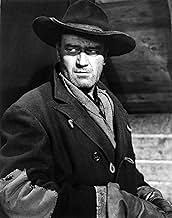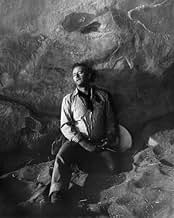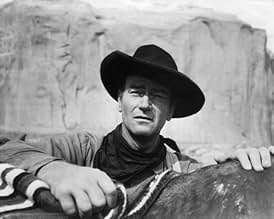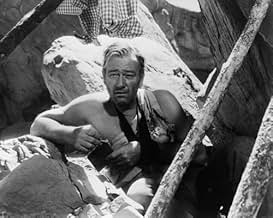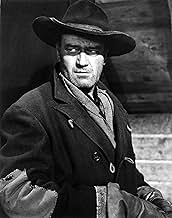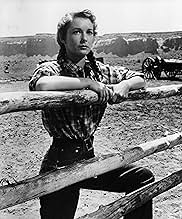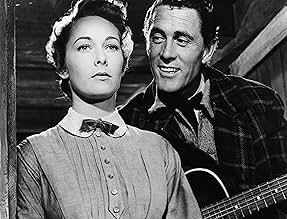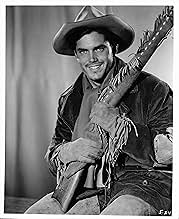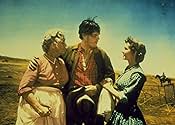Un veterano de la guerra civil estadounidense se embarca en un viaje de años para rescatar a su sobrina de los comanches después de que el resto de la familia de su hermano sea masacrada en ... Leer todoUn veterano de la guerra civil estadounidense se embarca en un viaje de años para rescatar a su sobrina de los comanches después de que el resto de la familia de su hermano sea masacrada en un asalto a su granja de Texas.Un veterano de la guerra civil estadounidense se embarca en un viaje de años para rescatar a su sobrina de los comanches después de que el resto de la familia de su hermano sea masacrada en un asalto a su granja de Texas.
- Dirección
- Guión
- Reparto principal
- Premios
- 4 premios y 4 nominaciones en total
Patrick Wayne
- Lt. Greenhill
- (as Pat Wayne)
Reseñas destacadas
John Ford and John Wayne re-team for their best and most famous western. Wayne plays returning Civil War veteran Ethan Edwards, who comes to the Texas ranch of his brother on hopes of settling down to a new life. Unfortunately, these plans are cruelly thwarted when the ranch(filled with the women and children) is raided by ruthless and renegade Indian chief Scar, who attacks and massacres the family, except for little Debbie Edwards(Natalie Wood) Ethan, enraged and distraught by this raid, vows to track down and kill the tribe, and rescue his niece, with the help from his nephew Martin(played by Jeffrey Hunter). This search takes several years of their lives, across the country and through all kinds of weather and obstacles, until one day they finally locate Debbie, who is now assimilated into the tribe Ethan hates, and he may not be able to spare her...
Gorgeously filmed on location in Ford's beloved Monument Valley, with an intelligent and ambitious script and a superlative performance by Wayne, as a driven and vengeful man who is not always likable, but is still righteous and fascinating. Film does ramble a bit, and the outcome is not really in doubt, but excellent film is still worth watching, with an astonishing closing scene.
Gorgeously filmed on location in Ford's beloved Monument Valley, with an intelligent and ambitious script and a superlative performance by Wayne, as a driven and vengeful man who is not always likable, but is still righteous and fascinating. Film does ramble a bit, and the outcome is not really in doubt, but excellent film is still worth watching, with an astonishing closing scene.
Many people would probably watch a film like this and come away thinking that it was too long and slow - but they'd be wrong. It's the perfect length for an epic visual feast. It tells a story in it's own impeccable time. It is a story spread over a period of years after all. The dialogue is brilliant, I love the way (now considered cheesy or clichéd phrases etc) the characters express themselves. The concept of the ruthless, merciless good guy isn't new but in this film I feel it's produced to perfection. I can only imagine that this movie is one of the first of it's kind.
In an attempt not to be over analysing things, it seems to me that there is real depth to an old school cowboy and Indian picture. This is regard to the themes of racism and revenge, the war torn vet. Even the more obvious rebellion and admiration adds even more complexity to it. However, by modern standards, the acting is questionable. It's melodramatic to say the least and John Wayne, as iconic as he is, isn't brilliant. You can see him anticipating his next lines, you can see in his eyes that this is just another day at the office. But hell, this was a different time and a different method.
In an attempt not to be over analysing things, it seems to me that there is real depth to an old school cowboy and Indian picture. This is regard to the themes of racism and revenge, the war torn vet. Even the more obvious rebellion and admiration adds even more complexity to it. However, by modern standards, the acting is questionable. It's melodramatic to say the least and John Wayne, as iconic as he is, isn't brilliant. You can see him anticipating his next lines, you can see in his eyes that this is just another day at the office. But hell, this was a different time and a different method.
Even if you've never seen John Ford's THE SEARCHERS, you will have, undoubtedly, seen a film that owes it's 'style' to the film. DANCES WITH WOLVES, THE OUTLAW JOSIE WALES, UNFORGIVEN, JEREMIAH JOHNSON, and OPEN RANGE are just a few westerns that have 'borrowed' from it, but THE SEARCHERS' impact transcends the genre, itself; STAR WARS, THE English PATIENT, THE LAST SAMURAI, even THE LORD OF THE RINGS have elements that can be traced back to Ford's 1956 'intimate' epic. When you add the fact that THE SEARCHERS also contains John Wayne's greatest performance to the film's merits, it becomes easy to see why it is on the short list of the greatest motion pictures ever made.
The plot is deceptively simple; after a Comanche raiding party massacres a family, taking the youngest daughter prisoner, her uncle, Ethan Edwards (Wayne), and adopted brother, Martin Pawley (Jeffrey Hunter), begin a long quest to try and rescue her. Over the course of years, a rich tapestry of characters and events unfold, as the nature of the pair's motives are revealed, and bigoted, bitter Edwards emerges as a twisted man bent on killing the 'tainted' white girl. Only Pawley's love of his 'sister' and determination to protect her stands in his way, making the film's climax, and Wayne's portrayal of Edwards, an unforgettable experience.
With all of Ford's unique 'touches' clearly in evidence (the doorways 'framing' the film's opening and conclusion, with a cave opening serving the same function at the film's climax; the extensive use of Monument Valley; and the nearly lurid palette of color highlighting key moments) and his reliance on his 'stock' company of players (Wayne, Ward Bond, John Qualen, Olive Carey, Harry Carey, Jr, Hank Worden, and Ken Curtis), the film marks the emergence of the 'mature' Ford, no longer deifying the innocence of the era, but dealing with it in human terms, where 'white men' were as capable of savagery as Indians, frequently with less justification.
Featuring 18-year old Natalie Wood in one of her first 'adult' roles, the sparkling Vera Miles as Pawley's love interest, Wayne's son Patrick in comic relief, and the harmonies of the Sons of the Pioneers accenting Max Steiner's rich score, THE SEARCHERS is a timeless movie experience that becomes richer with each viewing.
It is truly a masterpiece!
The plot is deceptively simple; after a Comanche raiding party massacres a family, taking the youngest daughter prisoner, her uncle, Ethan Edwards (Wayne), and adopted brother, Martin Pawley (Jeffrey Hunter), begin a long quest to try and rescue her. Over the course of years, a rich tapestry of characters and events unfold, as the nature of the pair's motives are revealed, and bigoted, bitter Edwards emerges as a twisted man bent on killing the 'tainted' white girl. Only Pawley's love of his 'sister' and determination to protect her stands in his way, making the film's climax, and Wayne's portrayal of Edwards, an unforgettable experience.
With all of Ford's unique 'touches' clearly in evidence (the doorways 'framing' the film's opening and conclusion, with a cave opening serving the same function at the film's climax; the extensive use of Monument Valley; and the nearly lurid palette of color highlighting key moments) and his reliance on his 'stock' company of players (Wayne, Ward Bond, John Qualen, Olive Carey, Harry Carey, Jr, Hank Worden, and Ken Curtis), the film marks the emergence of the 'mature' Ford, no longer deifying the innocence of the era, but dealing with it in human terms, where 'white men' were as capable of savagery as Indians, frequently with less justification.
Featuring 18-year old Natalie Wood in one of her first 'adult' roles, the sparkling Vera Miles as Pawley's love interest, Wayne's son Patrick in comic relief, and the harmonies of the Sons of the Pioneers accenting Max Steiner's rich score, THE SEARCHERS is a timeless movie experience that becomes richer with each viewing.
It is truly a masterpiece!
John Ford is a classic Western filmmaker (though certainly not the only genre in which he excelled), employing the classic Western film star, John Wayne, in perhaps one of the most underappreciated films of our time. Ford builds a thoroughly entertaining movie which explores classic Western themes without necessarily relying on these themes to drive the plot.
Like any good Western, we are inorexably drawn to a kind of Cowboys vs. Indians saga, but Ford manages to draw us into the conflict in such a way that the mere "Cowboys good, Indians bad" aesthetic isn't really applicable here. While relying on the archetypical roles of the two groups to set up a conflict, Ford is ahead of his time in managing to characterize the Indians as more than "noble savages". Wayne's character's (Ethan Edwards) hatred of "the Commanch" is called into question a number of times, especially in his stormy relationship with adopted nephew and fellow searcher Martin Pawley (Jeffrey Hunter), who we are told is a quarter-Indian himself, and cannot bring himself to find the same sort of hatred for the Indians that Ethan holds.
Ethan was a Confederate soldier in the Civil War, returning to his brother's Texas homestead after the war. A group of Commanches, led by the ominous Chief Scar, route and kill his brother's family while Ethan and Martin are investigating a cattle rustling, the Commaches' diversionary tactic. The Indians took the family's youngest daughter, and the majority of the film has us following Ethan and Martin in their attempts to track down Scar and take back the girl, Debbie (played by Lorna and Natalie Wood, at different times).
Such a situation sets up one of the many moral ambiguities that make this more than an ordinary Western: the Commanches slaughtered Ethan's brother and his family - he seemingly has reason to hate them with the almost crazy passion that he does. Yet the more naive Martin cannot bring himself to hate them in such a way, and the split between them becomes a major point of contention when it becomes clear that Debbie has more or less been adopted as a Commanche (the two "Searchers" chase after her for about five years in film time). Furthermore, when the two "Searchers" actually meet Scar, who they've been chasing for years, he is presented as a rather intelligent character, although certainly one filled with vengance - he, too, has his reasons for waging war with the likes of Ethan and Martin, and cannot merely be written off a the type of bloodthirsty savage that is typical of the portrayal of most Indians within the genre.
The film relies on enough classic Western material to imbue with the feel with the sense of such pictures. Aside from the question of Ethan's morality, Wayne plays him with classic John Wayne freewheeling confidence and swagger that made the actor such an icon, and it comes off quite well. We are also given a side story involving Martin's romance with the hard-as-nails Laurie Jurgensen (played by Vera Miles, best known for playing Janet Leigh's sister in "Psycho"). The relationship is from a classic, archetypical Western mold - the two have been in love since they were kids, but Martin has responsibilites to his family that stop him from making the proper time for his beau, and his rough frontier-uprbringing leave him seemingly lacking the proper sensitivity for dealing with Laura (though he does, of course, have a heart of gold).
As a side note, this film should prove immensely interesting to any serious fan of the "Star Wars" trilogy (the original one). While those films undoubtably draw a great deal of inspiration from Kurosawa's samurai films, there is most certainly a great deal (especially in the film subtitled "A New Hope") drawn from here. One scene in particular (when Luke returns to his farm after stormtroopers have blasted in pieces) is virtually ripped straight from "The Searchers". Ford's film is also full of the sort of gallows humor present throughout the trilogy, and even incorporates some rather goofy characters, the half-cracked Mose Harper (Hank Warden) and the incredibly over-the-top rival for Laura's hand Charlie McCorry (Ken Curtis), without ruining the overall serious feel of the film, but managing to squeeze laughs out of absurd situations (such as a fight between Martin and Charlie) without compromising the ability to quickly return to a solemn tone. Such deft touch, as well as the addition of wise-cracking dialogue (provided largely by Wayne and Ward Bond here) are a large part of what made the original trilogy so successful, and it's strikingly similar to the type of paradigm on display between various characters here.
Regardless of ranting and raving about Star Wars, however, this is an excellent film on it's own merit.
Like any good Western, we are inorexably drawn to a kind of Cowboys vs. Indians saga, but Ford manages to draw us into the conflict in such a way that the mere "Cowboys good, Indians bad" aesthetic isn't really applicable here. While relying on the archetypical roles of the two groups to set up a conflict, Ford is ahead of his time in managing to characterize the Indians as more than "noble savages". Wayne's character's (Ethan Edwards) hatred of "the Commanch" is called into question a number of times, especially in his stormy relationship with adopted nephew and fellow searcher Martin Pawley (Jeffrey Hunter), who we are told is a quarter-Indian himself, and cannot bring himself to find the same sort of hatred for the Indians that Ethan holds.
Ethan was a Confederate soldier in the Civil War, returning to his brother's Texas homestead after the war. A group of Commanches, led by the ominous Chief Scar, route and kill his brother's family while Ethan and Martin are investigating a cattle rustling, the Commaches' diversionary tactic. The Indians took the family's youngest daughter, and the majority of the film has us following Ethan and Martin in their attempts to track down Scar and take back the girl, Debbie (played by Lorna and Natalie Wood, at different times).
Such a situation sets up one of the many moral ambiguities that make this more than an ordinary Western: the Commanches slaughtered Ethan's brother and his family - he seemingly has reason to hate them with the almost crazy passion that he does. Yet the more naive Martin cannot bring himself to hate them in such a way, and the split between them becomes a major point of contention when it becomes clear that Debbie has more or less been adopted as a Commanche (the two "Searchers" chase after her for about five years in film time). Furthermore, when the two "Searchers" actually meet Scar, who they've been chasing for years, he is presented as a rather intelligent character, although certainly one filled with vengance - he, too, has his reasons for waging war with the likes of Ethan and Martin, and cannot merely be written off a the type of bloodthirsty savage that is typical of the portrayal of most Indians within the genre.
The film relies on enough classic Western material to imbue with the feel with the sense of such pictures. Aside from the question of Ethan's morality, Wayne plays him with classic John Wayne freewheeling confidence and swagger that made the actor such an icon, and it comes off quite well. We are also given a side story involving Martin's romance with the hard-as-nails Laurie Jurgensen (played by Vera Miles, best known for playing Janet Leigh's sister in "Psycho"). The relationship is from a classic, archetypical Western mold - the two have been in love since they were kids, but Martin has responsibilites to his family that stop him from making the proper time for his beau, and his rough frontier-uprbringing leave him seemingly lacking the proper sensitivity for dealing with Laura (though he does, of course, have a heart of gold).
As a side note, this film should prove immensely interesting to any serious fan of the "Star Wars" trilogy (the original one). While those films undoubtably draw a great deal of inspiration from Kurosawa's samurai films, there is most certainly a great deal (especially in the film subtitled "A New Hope") drawn from here. One scene in particular (when Luke returns to his farm after stormtroopers have blasted in pieces) is virtually ripped straight from "The Searchers". Ford's film is also full of the sort of gallows humor present throughout the trilogy, and even incorporates some rather goofy characters, the half-cracked Mose Harper (Hank Warden) and the incredibly over-the-top rival for Laura's hand Charlie McCorry (Ken Curtis), without ruining the overall serious feel of the film, but managing to squeeze laughs out of absurd situations (such as a fight between Martin and Charlie) without compromising the ability to quickly return to a solemn tone. Such deft touch, as well as the addition of wise-cracking dialogue (provided largely by Wayne and Ward Bond here) are a large part of what made the original trilogy so successful, and it's strikingly similar to the type of paradigm on display between various characters here.
Regardless of ranting and raving about Star Wars, however, this is an excellent film on it's own merit.
If there is only one western that you must see from John Ford, I would say it is this one; though THE MAN WHO SHOT LIBERTY VALENCE is also absolutely unique, outstanding too. The element that makes those two films so stunning is not only the directing but the plot. This scheme was never made before and rarely copied since. Of course THE SEARCHERS plot will more or less inspire THE PROFESSIONALS, one decade later, from director Richard Brooks; just the overall scheme and especially ending, moral. The settings, landscape, music, acting, characters, everything is jawdropping and provokes emotion for anyone sensitive enough to feel all the power of this terrififc western. John Wayne gives his best performance, even better than in WAKE OF THE RED WITCH. One of the greatest ending ever.
¿Sabías que...?
- CuriosidadesBeulah Archuletta (Look) was found crying in one of the tipis by John Wayne in between shooting scenes. When Wayne asked her why she was crying, she responded that she was going to miss her son's wedding because she was filming her scenes at the time. Wayne stopped production of the film for a few days and flew her to California so that she could attend the wedding.
- PifiasThe "dead" Indian under the rock, when the rock is removed, is clearly breathing.
- Créditos adicionalesThe credits state this Warner Brothers film is in VistaVision; this may be the only Warner film in VistaVision.
- ConexionesEdited into Histoire(s) du cinéma: Fatale beauté (1994)
- Banda sonoraThe Searchers (Main Theme)
Composed by Max Steiner
Lyrics by Stan Jones
Sung by Sons of the Pioneers (uncredited)
Selecciones populares
Inicia sesión para calificar y añadir a tu lista para recibir recomendaciones personalizadas
Detalles
- Fecha de lanzamiento
- País de origen
- Idiomas
- Títulos en diferentes países
- Centaures del desert
- Localizaciones del rodaje
- Empresa productora
- Ver más compañías en los créditos en IMDbPro
Taquilla
- Presupuesto
- 3.750.000 US$ (estimación)
- Recaudación en todo el mundo
- 1071 US$
- Duración
- 1h 59min(119 min)
Contribuir a esta página
Sugerir un cambio o añadir el contenido que falta





